By Trilby MacDonald, Ecology Center Writer
Voters expect the government to serve the people and lawmakers to champion their interests. When this doesn’t happen, lawmakers are sometimes voted out. The idea behind energy democracy is that, like the government, utility companies should be accountable to the communities they serve. Access to clean, affordable energy should be a right, not a privilege. The current reality is that privately owned utility companies have all of the power of government but none of the responsibilities. Like any corporation, their primary responsibility is to make money for shareholders. With DTE and Consumers Energy pouring hefty campaign contributions into both parties, lawmakers have little incentive to hold them accountable.
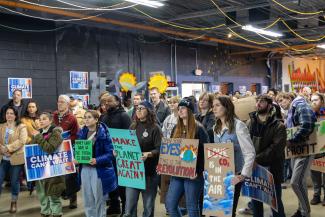
Energy democracy envisions a future where renewable, decentralized, and community-owned energy systems provide affordable and reliable power for everyone.
Tony Reames, Tishman Professor of Environmental Justice at U-M, underscores the importance of this shift:
"Energy democracy means ensuring that every community, especially those historically marginalized, can access affordable, reliable, and clean energy."
The Principles of Energy Democracy
The goal of the energy democracy movement is to shift control of the energy sector from utilities to people, creating resilient, affordable energy systems. With greater control over their energy supply, consumers can adopt clean, reliable, and affordable energy systems — even generating and managing their own local power. However, utilities’ commitment to maximizing profits means they will do everything they can to maintain the status quo. Communities must work much harder to take charge.
Michigan has a long way to go before true energy democracy can become a reality. Utility companies spend millions of dollars in ratepayer money lobbying lawmakers to discourage locally owned renewable energy systems. Lisa Wozniak, Executive Director of the Michigan League of Conservation Voters, points out the role that utility companies play in shaping energy policy to their advantage. "One of the most important things people need to understand is that our two monopoly utilities play a huge role in politics in Lansing. We passed good clean energy legislation in 2023, but it could have been stronger. Those utilities made sure it wasn’t."
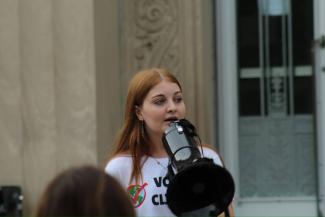
Mia Breznau, a student activist at Western Michigan University, explains how grassroots education plays a role in energy democracy: "The main thing that our group focuses on is peer education — talking to other students about this issue because our education system isn't letting them know what's up and what they can do. Then we do a lot of community work, bringing people together, creating a sense of community, and turning that into action." Her words embody the essence of successful social movements: shared values, collective awareness, and a deep sense of belonging that sustain community-driven change over time.
Rafael Mojica coordinates community projects for Soulardarity, a nonprofit working to expand solar energy in Highland Park. He emphasizes the importance of local energy ownership. "We don’t like to just say community solar. We like to say community-owned solar," he explains. "We want a system that is delivering a service to the public that is owned by the public, managed by the public, maintained by the public." His vision of a publicly-owned energy system may seem far-fetched, but communities across the country are finding creative ways to take their power back.
Ann Arbor is leading by example, and has created a variety of programs that reduce financial barriers to renewable energy. Missy Stults, Director of sustainability for Ann Arbor, emphasizes the need to offer residents a variety of ways to take advantage of clean energy. "We have to find solutions that acknowledge the system has been extractive. We need to try to correct that to the full extent we can, and we need to recognize that one solution is not going to work for the entire marketplace. We're going to need lots of different things for different situations."

The Failures of the Current Energy System
While energy democracy is a bold vision, an energy system that perpetuates inequality and injustice is clearly broken. Alexis Blizman, Legislative and Policy Director for the Ecology Center, describes the extent of utility companies’ power: "The utilities spend an absolute fortune lobbying the legislature ... They pay for influence and that leaves the consumers out in the cold and heat."
This outsized influence leads to policies that allow for multiple rate increases a year. DTE requested another rate hike in April of 2025 after securing a $217 million increase for metro Detroit customers in January. "Rates are going up every year … Each utility is filing a new rate case almost as soon as the Commission makes a decision on their previous one, and each request is larger than the last” Blizman notes, explaining how residents are forced to shoulder the greatest burden of rate hikes while industrial customers have negotiated favorable deals.
Tecreshia Rana, a volunteer with the Michigan Environmental Justice Coalition, describes the struggle: "I think the fact that energy is natural and we have to pay an arm and a leg for it is ridiculous. People have to take second jobs just to keep the lights on." For people like her, energy democracy is not just a policy goal — it is a matter of survival.
For all the money they have to spend on energy, residents are not getting good service. Decades of neglect have left energy infrastructure in disrepair, leading to blackouts, gas leaks, and unsafe conditions. Power outages in Michigan increased 79% between 2011 and 2021 compared with the previous decade.
Community-Led Solutions
Grassroots organizations and forward-thinking cities are proving that energy democracy is possible. In Highland Park, the nonprofit Soulardarity has installed solar-powered street lights equipped with free wifi, helping the community improve connectivity and reclaim control over its energy infrastructure after DTE removed streetlights due to the city’s unpaid bills. "We should be demanding no more blackouts. We should be demanding far more affordable rates," says Mojica, who is working with Soulardarity to install solar street lights across the city.
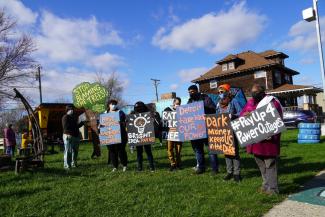
In 2023, Ann Arbor residents voted to create a Sustainable Energy Utility (SEU), a city-run initiative that provides affordable ways for residents to use solar power. Through the program, residents can have solar panels installed on their homes at no upfront cost, paying only for the energy produced. In the next phase, the SEU will create microgrids that allow neighbors to share power, making the city’s energy system more resilient.
The Political Battle for Energy Democracy
While community-led solutions provide hope, utilities have lobbied aggressively to block policies that would allow for more community-owned energy generation. "Utilities are lobbying to stop any type of energy generation to be community-owned," Blizman explains.
Groups like Taking Back Our Power are working to let voters decide if utilities should be allowed to use taxpayer money to lobby lawmakers. "If anti-lobbying can get on the ballot, it could pass." Blizman stresses that a powerful, well-coordinated campaign would make this possible.
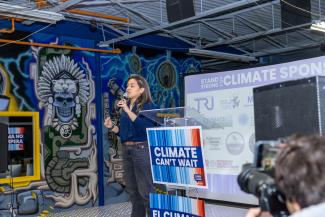
The Path Forward
A strong public engagement and education campaign will be necessary for energy democracy to succeed. Tecreshia Rana reflects on her own journey: "Before I joined MEJC (Michigan Environmental Justice Coalition,) I didn’t even know I had rights ... Awareness is everything." Education is particularly crucial for young people, who will shape the future of climate and energy policy. Mia Breznau emphasizes the need for better climate education: "The youth voice is one of the most powerful things we can leverage for issues like climate change. But I think the one thing that's dampening that is the lack of education ... Bringing full-scope climate education into our school system can teach students why this issue matters so much."
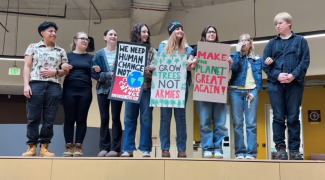
Advocates are working to change the rules so that energy prices are fair and grid improvements are planned wisely. They want to make sure that when utility companies decide on prices, they also think about what people can afford, and that rates are designed to ensure true affordability for all.
A Movement, Not Just an Idea
Energy democracy is not just about transitioning to clean energy — it is about ensuring that the transition is just, equitable, and community-driven. "Energy justice work is more than just an idea. It is a movement." says Tony Reames.
The fight against utility monopolies and rising energy costs is a fight for justice. Through grassroots activism, policy reform, and creative community energy initiatives, a cleaner and fairer energy future is within reach.


